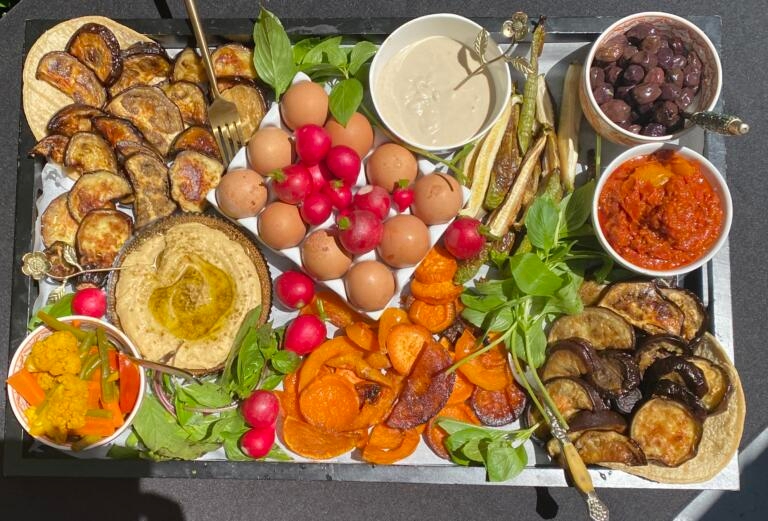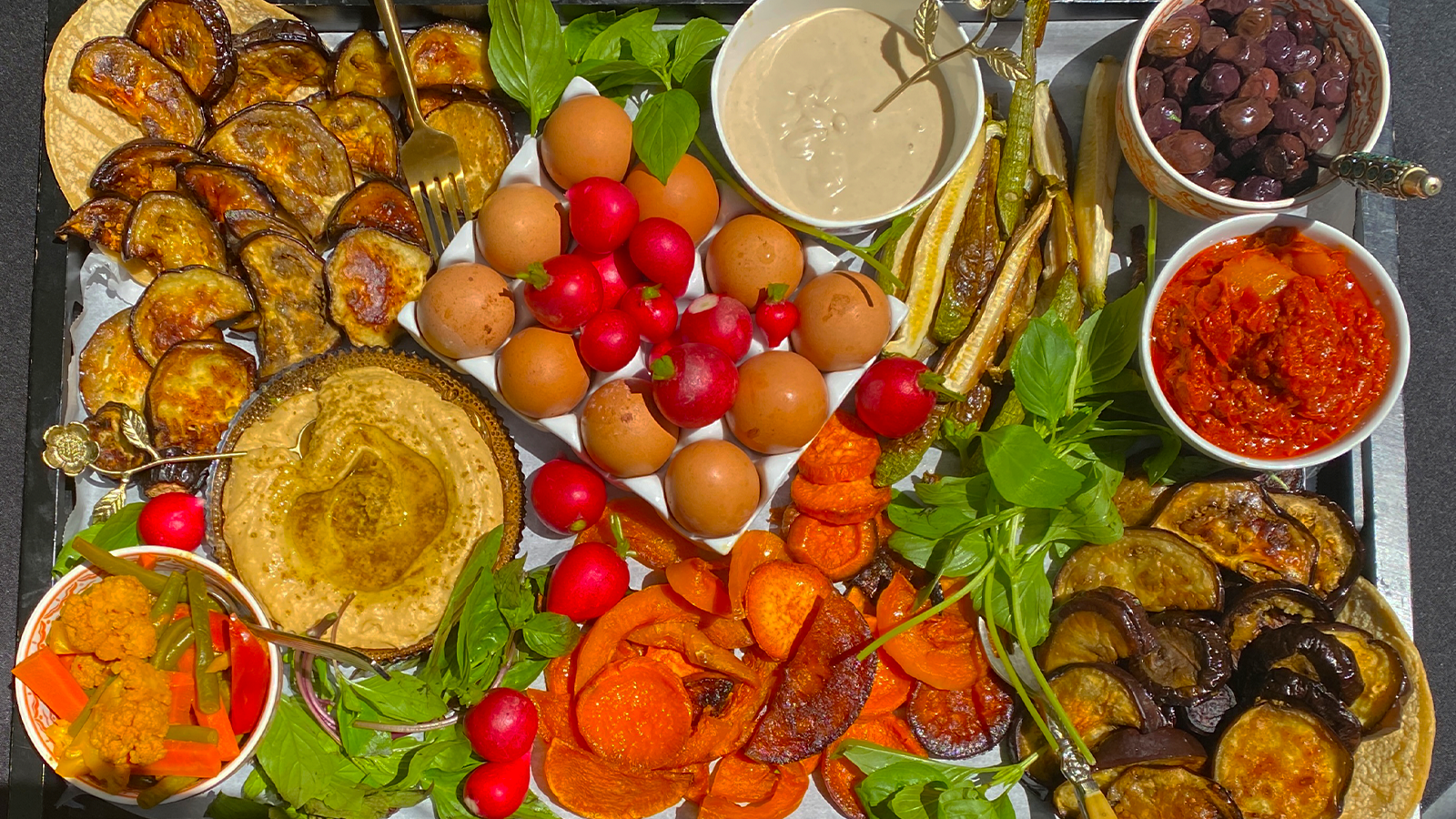Two months after I started to date my future husband, I asked him, “Am I more Israeli, Australian or American?”
His answer surprised me: “You’re more Iraqi.”
My parents were born in Iraq but they met and married in Israel, where I was born. My mother’s family moved to Australia in 1967, and my family followed, landing there on my second birthday in 1968.
By the age of 5, I was putting in solid hours as my grandmother’s sous chef in her kitchen in Rose Bay, a suburb of Sydney. While I spoke Hebrew with my father and English with my mother, I spoke a Judeo-Iraqi-Arabic dialect with my Nana Aziza. I was the official interpreter on our shopping expeditions to Bondi Junction.
The Nosher celebrates the traditions and recipes that have brought Jews together for centuries. Donate today to keep The Nosher's stories and recipes accessible to all.
When I was 7, my family and I visited Israel. In the kitchen at my uncle’s apartment in Petah Tikva, unbeknownst to me, I was naming the fruits and vegetables in Arabic, prompting hysterical laughter from the Baghdadi-born wives of two of my uncles. I quickly learned that ba’ban jan was cha’tzil (eggplant) and ka’ra was d’la’at (pumpkin or squash).
In Sydney, my grandmother continued to prepare the traditional Iraqi Jewish Shabbat breakfast. Every Friday morning she would peel, slice and brine the deep purple ba’ban jan and put it in the sun to drain for several hours before frying it. She would peel the bright orange ka’ra, then fry it to crispy golden-brown perfection. She would make her t’beet, a slow-cooked Iraqi chicken and rice dish, and place the eggs on top, ready to roast overnight in the oven. She would boil potatoes in their skins and carefully wash tons of Italian parsley and romaine lettuce.
On Shabbat days when the weather was warm, my entire extended family (my mother comes from a family of eight) would enjoy our Iraqi breakfast al fresco. There were velvety, caramelized brown bethi mel Shabbath: eggs that have cooked overnight, also known in Ladino as huevos haminados; fried eggplant and butternut squash; boiled potatoes, perfectly sliced with a heavy sprinkle of black pepper; and z’lata (salad) of bright red tomatoes, crisp cucumber and earthy parsley, flecked with purple onion and a citrusy dressing.
My grandmother prided herself on her homemade condiments, loading the table with pungent, deep yellow amba (pickled mango sauce), spicy green Yemenite zhug and turshi, a combination of cauliflower, green beans, carrots, red pepper and garlic pickled in a spicy-sweet, curry and turmeric brine. Not to mention hummus, tahini, fij’il (radishes) and bas’l akhdar (scallions). There were freshly baked large pitas and everyone would happily make their own laffa (Iraqi-style rolled sandwich).
Legend has it that in the early 1960s, an Iraqi immigrant named Sabich had a little snack stand near the bus depot in Ramat Gan, Israel. The bus drivers ending their shifts asked him to sell ready-made food, so he combined all of the ingredients of the classic Iraqi breakfast in laffa, pillowy sheets of Iraqi flatbread. Sabich remains one of the most popular street foods of Israel.
Now living in Los Angeles, my family still eats this Iraqi breakfast every Shabbat. I think of my grandmother and her abundant patience to stand for hours and fry everything, and pray that, as she watches me from Heaven, she forgives me for being lazy. No frying for me — I roast my eggplant and butternut squash in the oven. And my great aunt Tina taught me a great hack for baking the Shabbat eggs: Wrapping the entire cardboard container with a double layer of foil. While I buy my amba from the kosher market or Trader Joe’s, I do pickle my own turshi — just like my Nana Aziza did.
Note: You can make eggplant and squash a day in advance. Store, covered, in the refrigerator and let them come to room temperature before serving.

Sabich (Jewish Iraqi Breakfast) Recipe
From Baghdad, with love.
- Total Time: 6 hours 30 minutes
- Yield: Serves 12
Ingredients
For the eggs:
- a carton of 1 dozen eggs
For the butternut squash:
- 1 medium butternut squash, peeled, seeded and sliced in half moons
- ⅓ cup extra-virgin olive or avocado oil
- ½ tsp salt
- ½ tsp sugar
For the eggplant:
- 3 medium eggplants, washed and dried
- kosher salt
- ⅓ cup avocado or vegetable oil
- 1 tsp garlic powder
- slice eggplant in ¼-inch-thick rounds
For the salad:
- 1 pint (10 ounces) cherry tomatoes, halved
- 2 Roma tomatoes, diced
- 3 Persian cucumbers, diced
- 1 red pepper, seeded and diced
- 1 purple onion, finely chopped
- 1 bunch Italian parsley, finely chopped
- 2 lemons, juiced
- 4 Tbsp olive oil
- salt and pepper, to taste
To serve:
- fresh pita or laffa
- amba
- turshi (pickled vegetables)
Instructions
- To make the slow-cooked eggs, preheat oven to 350°F.
- Double wrap your cardboard container of eggs in foil.
- Bake for 1 hour, then reduce heat to 225°F and bake at least 4 hours or overnight.
- Sprinkle kosher salt over the eggplant. Drain in colander for at least 1 hour.
- To make the squash and eggplant (you can do this a day in advance), preheat oven to 400°F.
- Cut up squash and place slices on a baking sheet. Coat with oil and dust with salt and sugar.
- Grease baking sheet with oil, then place eggplant slices in a single layer, making sure not to overlap. Sprinkle with garlic powder, then drizzle with a little more oil.
- Bake the squash and eggplant for 15-20 minutes until golden.
- Combine the first six ingredients for the salad in a serving bowl. Dress with lemon, olive oil, salt and pepper 10-15 minutes before serving.
Notes
Note: You can make eggplant and squash a day in advance. Store, covered, in the refrigerator and let them come to room temperature before serving.
- Prep Time: 1 hours 15 minutes
- Cook Time: 5 hours 15 minutes
- Category: Entree
- Method: Baking
- Cuisine: Sephardic




Salad
Beitza
Chatzilim.
= SaBiCh
I love your family stories, and the recipes look delicious!! Is your grandmother’s cookbook available for purchase anywhere? I would love a copy!